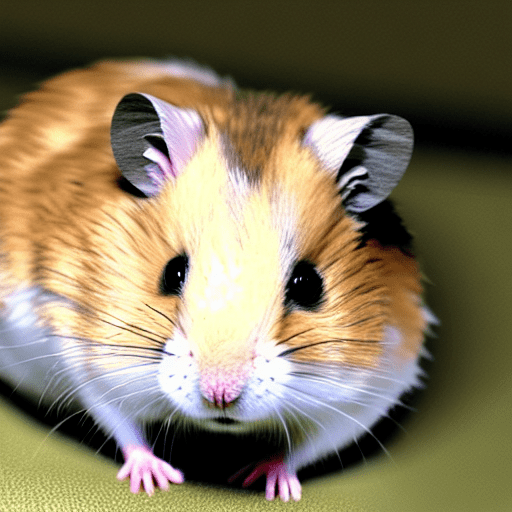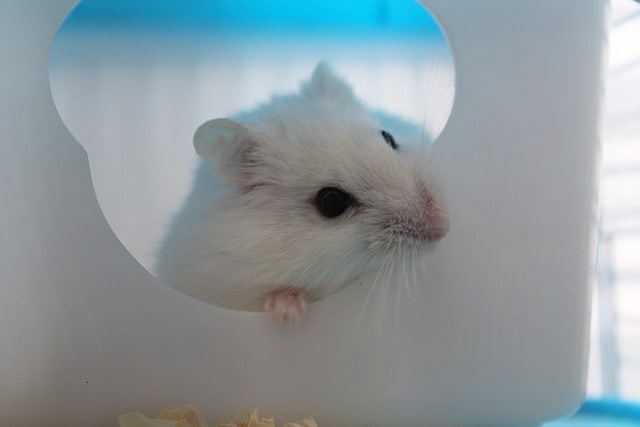Your hamster is breathing fast due to potential stress or a respiratory infection. Here’s why and what you can do to help.
Hamsters are adorable little pets known for their energetic nature and curious behavior. As a responsible hamster owner, it’s crucial to keep a close eye on your furry friend’s well-being. One concerning observation you may come across is your hamster breathing fast.
Rapid breathing in hamsters can be an indication of underlying issues that require attention. This article will delve into the reasons why your hamster may be breathing rapidly and provide guidance on how to address this concern. By understanding these factors and taking appropriate action, you can ensure your hamster’s health and happiness.
Common Causes Of Fast Breathing In Hamsters
Fast breathing in hamsters can be a cause for concern, and it’s important to understand the common causes behind it. One possible reason for fast breathing in hamsters is
respiratory infections. These infections can be caused by viruses, bacteria, or other pathogens and may result in symptoms such as wheezing, coughing, and rapid breathing.
Allergies or asthma can also contribute to fast breathing in hamsters. Just like humans, hamsters can have allergic reactions to certain substances or develop respiratory conditions like asthma. Lastly,
stress or anxiety can lead to elevated breathing rates in hamsters. Factors such as a change in environment, lack of proper socialization, or excessive noise can cause stress and anxiety in these small pets.
Health Issues That Cause Fast Breathing In Hamsters
Health Issues That Cause Fast Breathing in Hamsters
Fast breathing in hamsters can be a sign of various health issues that require immediate attention.
| Heart Disease |
| Heart disease in hamsters can lead to fast breathing. It can be caused by a congenital heart defect or age-related changes in the heart’s function. |
- Obesity: Excessive weight can put strain on a hamster’s organs and respiratory system, causing rapid breathing.
- Tumors: Tumors, particularly those affecting the lungs or respiratory system, can lead to quickened breathing in hamsters.
If you notice your hamster is breathing rapidly, it is essential to consult a veterinarian. They will be able to diagnose the underlying cause and provide appropriate treatment.
Environmental Factors That Affect Hamster Breathing
Hamsters are sensitive creatures, and their breathing can be affected by various environmental factors. One such factor is poor ventilation, which can cause stagnant air to accumulate in their cages. This restricted airflow can lead to increased respiratory rates as hamsters struggle to breathe properly. It is essential to ensure that their living space has adequate ventilation to prevent this issue. Additionally, high temperatures can also impact hamster breathing. Hot and stuffy environments can cause them to breathe faster as they try to cool down. Maintaining a comfortable temperature for your furry friend is crucial to prevent any respiratory distress. Another factor to consider is air quality. Dust, allergens, and pollutants in the air can trigger respiratory issues in hamsters, leading to faster breathing rates. Regular cleaning and proper air filtration can help maintain good air quality for your pet.
Identifying The Symptoms Of Fast Breathing In Hamsters
Fast breathing in hamsters can be a sign of underlying health issues that require immediate attention. One of the symptoms to look out for is a rapid breathing rate. If you notice your hamster breathing faster than usual, it may indicate a respiratory problem or stress. Another symptom to watch for is labored breathing, which can be identified by the hamster struggling to take in air or visibly using extra effort to breathe. Additionally, wheezing or sneezing may be observed, suggesting congestion or an infection in the respiratory system. If you notice any of these symptoms, it is important to consult a veterinarian who specializes in small animals. Prompt diagnosis and appropriate treatment can help ensure your hamster’s well-being.
How To Provide First Aid For A Hamster With Fast Breathing
When you notice that your hamster is breathing fast, it is important to take immediate action to ensure their health and well-being. First and foremost, you should isolate the hamster in a quiet and stress-free environment. This will help to minimize any potential triggers that could be causing their rapid breathing. Next, ensure that the hamster has access to fresh air and proper ventilation. Keep their cage clean and well-maintained to prevent any buildup of harmful particles or irritants in the air. Lastly, it is crucial to consult a veterinarian for professional guidance and medical advice. They will be able to assess the situation and provide the necessary treatment or therapeutic interventions to address the underlying cause of the hamster’s fast breathing.
Preventive Measures To Avoid Fast Breathing In Hamsters
It is important to monitor your hamster’s breathing rate as fast breathing can be a sign of underlying health issues. To prevent fast breathing in hamsters, it is crucial to maintain a clean and stress-free environment for them. Ensure that their cages are cleaned regularly to prevent any buildup of bacteria or allergens that could affect their respiratory system.
In addition, providing a balanced diet and regular exercise is essential. Hamsters need a diet that is rich in nutrients and low in fat. Include a variety of fresh fruits, vegetables, and high-quality hamster pellets in their diet. Regular exercise helps to keep their respiratory system and overall health in good condition.
If you notice any symptoms such as rapid or labored breathing, wheezing, or coughing, it is recommended to seek veterinary care immediately. A veterinarian can diagnose any underlying health issues and provide appropriate treatment.
Frequently Asked Questions On Why is my Hamster Breathing Fast
Why Is My Hamster Breathing Fast And Making Weird Noises?
Your hamster may be breathing fast and making weird noises due to stress, respiratory infection, or a blocked airway. It’s crucial to monitor their behavior and consult a veterinarian if the symptoms persist or worsen.
How Can I Help My Hamster With Breathing Problems?
To help your hamster with breathing problems, provide a clean, well-ventilated environment. Avoid smoking near your hamster and keep it away from household chemicals or strong smells. Consult a vet to rule out any underlying health issues. Keep their bedding clean to prevent allergies and dust particles.
Monitor their breathing and seek medical attention if the problem persists.
Why Is My Hamster Cold But Breathing?
Your hamster may be cold but still breathing because it could be trying to regulate its body temperature. Hamsters can go into a hibernation-like state if they get too cold, slowing down their breathing and heart rate. Monitor your pet’s condition and ensure it stays warm.
Why Is My Hamster Taking Slow Deep Breaths?
Slow deep breaths in hamsters can indicate stress, pain, or respiratory issues. Ensure the cage is clean, the temperature is suitable, and there are no irritants present. If the behavior persists, consult a vet for a proper diagnosis and treatment.
Conclusion
To conclude, it is crucial to pay attention to any changes in your hamster’s breathing patterns. Rapid breathing could be a sign of various underlying health issues such as stress, respiratory infections, or heart problems. By monitoring your hamster closely and seeking veterinary help when necessary, you can ensure your furry friend’s well-being and provide appropriate care.
Remember, a healthy and happy hamster breathes at a steady and comfortable pace.


